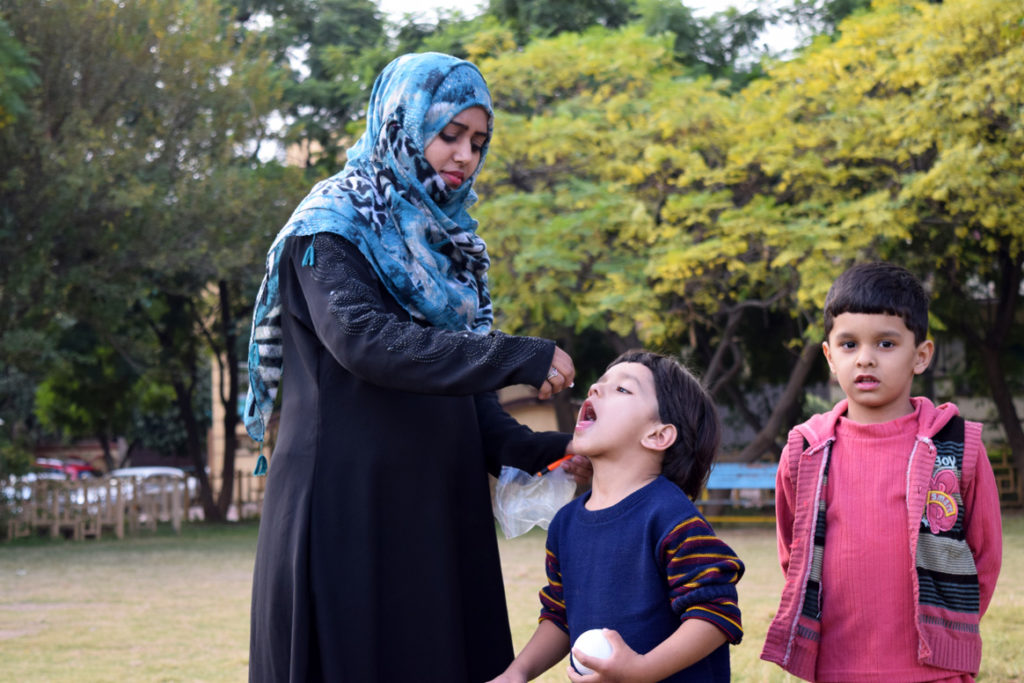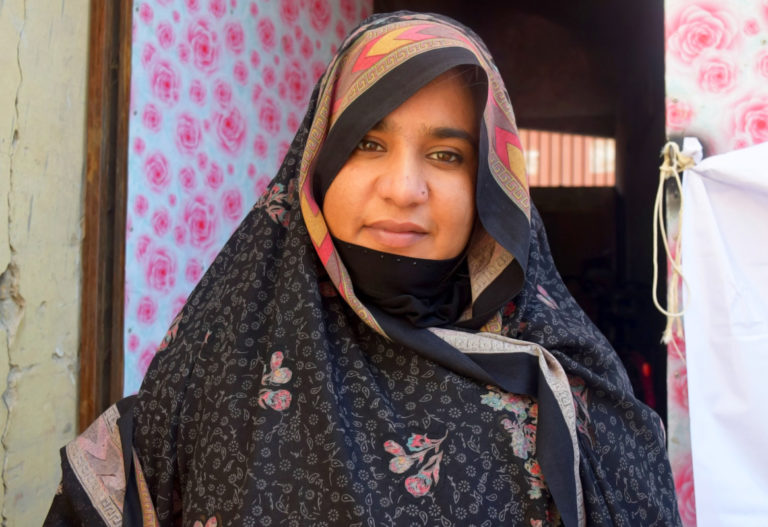On International Women’s Day, we celebrate the role of women in the polio eradication efforts in Pakistan

Like many Pakistani women, Hafiza and Sahiqa start their days in the early morning, when other household members are still asleep. They tackle their domestic chores before beginning their official duties – as polio frontline workers.
“I get up by 5:00 am, if I am to prepare properly for a productive day. I need to manage my home chores before I can set out for my official work. I have to prepare breakfast, lunch, lunch boxes for my children and do the dishes. After that I clean the house and then I have to prepare my kids for school. After sending them to school, I leave for the office around 7:30 am,” Sahiqa explained.
Sahiqa (29) is from Quetta in Balochistan province and Hafiza (22) is from Islamabad. In their careers as Pakistan’s cadre of Lady Health Workers, they deliver house-to-house preventative and curative care to underserved communities, in particular women and children in urban and rural slum areas Locally recruited and community-based, these female health workers are also central to progress against polio in Pakistan’s complex environment.
Across Pakistan, thousands of women do the vital work of immunization in an environment that can be harsh, distressing and even dangerous. They balance this work with the demands of their own children and families, and they put their own needs last.
The women’s official workday starts at 8:00 am and is marked by interactions with the community every day. As part of their work, Lady Health Workers educate women about the benefits of exclusive breastfeeding, on better hygiene practices, supporting the advancement of women and children’s health and wellbeing. They knock on every door of their assigned areas to vaccinate children against polio during frequent immunization campaigns.

In Pakistan, women currently make up more than 56% of more than 260 000 frontline polio workers. Having women on the frontlines has been a game changer for polio eradication in Pakistan, given the trusted roles they have in communities and the fact that they are more likely to be allowed to take the crucial step across the thresholds of people’s homes and ensure access for all children to vaccines. Female polio frontline workers including vaccinators, campaign coordinators, supervisors and social mobilizers often work in extremely challenging circumstances to ensure children are protected against polio.
“I remember one chronic refusal family. It was such a difficult task to convince the women of the house to vaccinate their children. We engaged in many discussions and I explained to them that if the polio drops were not beneficial, would I give them to my own kids?
After a lot of convincing, I was able to persuade the women. I was so happy to have managed to convert a chronic refusal case and protect the kids in that house against polio,” Sahiqa said.
Despite multiple challenges, especially working in a conservative province like Balochistan, the health workers remain steadfast and intensely committed when it comes to achieving their goals. They have become creative problem solvers who are motivated by every refusal they convert. The challenges act as fuel and have helped them develop the skills they need to navigate the complexities of the job in this cultural context.
“While performing my job, remaining calm and controlling my emotions are the most difficult skills that I have drawn from these challenges. During this job, I learnt a lot how to avoid taking things personally as this helped me focus on the real objective. With the passage of time, I have realized the importance of maintaining firm boundaries in order to facilitate respectful communication with people,” said Hafiza.
There are different reasons why women in Pakistan make the choice to become polio frontline workers. Some have to support their families and some have to earn money for their studies. Many women take this job because it is the best opportunity to move ahead in life. The defining characteristic of most female polio frontline workers is a passion to serve humanity.
“I feel lucky to have my husband beside me, supporting me in every endeavour. He is also a polio worker and he feels that women have better access to the homes in the communities and can relate to the mothers therefore they have a definite advantage in gaining the trust of the homemakers in the community,” Sahiqa said.
The day is over, but their work is not
The women’s official duty ends with the setting sun, but at home domestic responsibilities await. They have to prepare dinner for the family and then help children complete homework. The idea of eight hours of uninterrupted sleep is a dream for them, but they sleep with the knowledge that they are doing important work, and doing it well.
Hafiza and Sahiqa are individual women, but they are also a reflection of every female worker who is part of the fight against polio. The polio eradication programme would not be where it is today without the contributions of hardworking women dedicated to ending polio.
